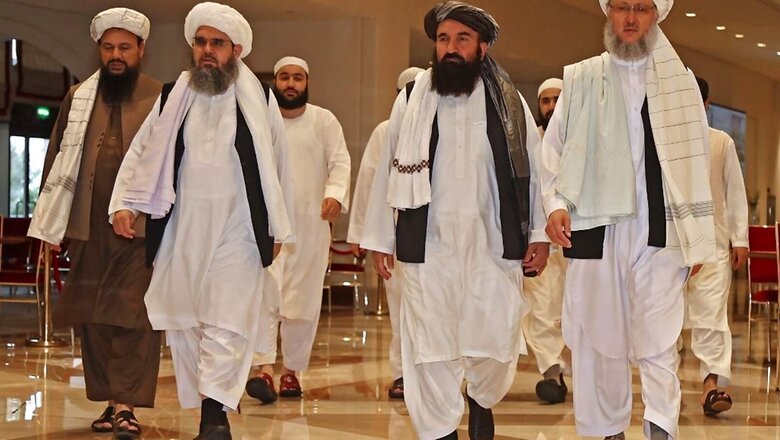
views
All the diplomatic efforts that have been made over the years in various formats to bring peace and stability to Afghanistan are ending in a fiasco. Apart from the Doha peace process, the Russian, Chinese and the Turks have also been involved in various peace processes. Political reconciliation in Afghanistan has been the mantra for long, with an Afghanistan High Peace Council (HPC) established 11 years ago to negotiate with elements of the Taliban. All to no avail.
While the US desire to extract itself from the Afghan quagmire is understandable, the manner in which it has handled its exit from Afghanistan has been deeply flawed. For years the US leadership, including its military brass, has said publicly that there was no military solution to the problem in Afghanistan. Such statements from the world’s most powerful military force fighting a ragtag insurgency carried implications beyond Afghanistan about US power. They also served to make the insurgents more confident about the ultimate success of their campaign.
The US setting the date of US withdrawal has been self-defeating. If meant to prod the Kabul government to put its house in order and assume more responsibility for the country’s security, it failed in its objective as the political fractiousness in Kabul has continued. If it was an assurance to the Taliban that the US intended to withdraw its forces from Afghanistan, which has been the Taliban demand, it only served to convince the Taliban that time was on their side and they could wait out the Americans by making motions to negotiate but simultaneously keep the pot boiling on the ground to improve their bargaining position.
How India Reads Doha Agreement
Trump entering into the Doha agreement over the head of the Kabul government with the Taliban was objectionable on many grounds. It violated the consensus “rhetoric" that the Afghan peace process should be Afghan-led and Afghan-owned. It gave legitimacy to the insurgency and accorded it political equality with the UN-recognised government in Kabul. It allowed the Taliban to designate themselves as the Islamic Emirate of Afghanistan in the formal text, though not recognised by the US as such in the same document!
The Doha agreement contradicted America’s global positions on democracy, terrorism, human rights, religious extremism, gender rights, and so on. The Taliban were being offered a share of power without any democratic process, their repeated brutal terrorist acts against innocent Afghans were not only ignored but the Taliban were allowed to leverage these to their advantage, their equivocation on women’s rights and assertions that the Afghan constitution will be based on Islamic principles etc. did not make them an ineligible partner.
ALSO READ | Afghanistan President Ashraf Ghani’s Pakistan Gambit Was Based on 3 Promises and None Were Kept
From India’s point of view the Doha agreement was a US sell-out to the Taliban and Pakistan, unmindful of India’s security concerns. It commits the Taliban not to undertake terrorist acts against the US and its allies, implicitly excluding India, well knowing that Pakistan has been using Afghanistan under the Taliban in the past to train and deploy jihadi terrorists against India. If combating terror is the responsibility of the international community as a whole, a broader commitment by the Taliban eschewing terrorism in all directions was needed.
The US is aware of Pakistani ambitions in Afghanistan and its declared goal of diluting India’s presence there. The Pakistani foreign minister and the country’s national security adviser indict India’s presence and role in Afghanistan as unduly large and misused to promote terrorism in Pakistan. The intimate links between the Taliban and Pakistan are well-established and yet the US chose to open doors for Pakistan to gain strategic depth in Afghanistan.
India has had to manage this unpleasant reality as best as possible. India has played the US game by supporting the Doha agreement, agreeing to be present at Doha and finding common language with the Americans that pays lip service to now meaningless formulations about an Afghan-led, Afghan-owned reconciliation process, protecting the freedoms gained in the last 18 years, especially women’s rights etc.
Different Countries, Different Interests
Not only with the US, a gap has developed on Afghanistan between India and Russia too, which recognises the Taliban as a legitimate political force that needs to be accommodated. Russia has either reluctantly included India or excluded it from some rounds of dialogue on Afghanistan with the US, China and Pakistan. It has also ignored India’s obvious security interests, concerned more about the security of Central Asian states and its own from the spill-over of Islamic radicalism in Afghanistan.
It has maintained a bilateral dialogue with India, as has the US, but has indirectly yielded to Pakistani opposition to the involvement of India in the negotiations. China, of course, closely wedded to Pakistan, and seeking to shield Xinjiang from threats from the East Turkestan Independence Movement (ETIM) activists based in the Af-Pak region, has no interest in involving India in the dialogues on Afghanistan that it has organised.
The situation on the ground in Afghanistan has become alarming. The Taliban have captured large swathes of the country, including some provincial capitals, and are now in control of the border with Tajikistan and Iran. They have made more rapid gains on the ground than anticipated, with the Afghan national security forces performing poorly even in the face of inferior numbers. The threat to Kabul itself has become palpable. In some areas the Taliban have summarily executed surrendering Afghan forces, which “could" be war crimes according to a meek US State Department reaction.
EXCLUSIVE | As Taliban Close in on Kabul, New Peace Deal Being Drawn. Ghani to Go
The US, according to the State Department spokesperson, is still focused on diplomacy at a reconvened Doha conference to produce a just and durable solution, to press for a reduction of violence and a ceasefire, and to forge a commitment not to recognise any government imposed by force. With the military lever having proved ineffective, why the US thinks diplomatic sermons will be more persuasive with the Taliban is not clear. Surprisingly, the spokesperson also gives a clean chit to the Taliban to have adhered to an important part of the US-Taliban agreement in that they are not targeting the US or coalition forces. That the world’s foremost military power is thanking the rag-tag Taliban for sparing its forces from attacks and fearing that if any stayed on they would have become targets is surprising.
The Stakes for India
There is concern being expressed in some circles in India that we have been reduced to a bystander in Afghanistan, that we are now paying the price for not openly engaging the Taliban as other countries have done, that we should have tested the Taliban’s intentions towards us and made our red lines known to them, that we have lost our $3 billion investment in the country etc. All these arguments are contestable.
Unlike Pakistan, China and Iran, we have no contiguity with Afghanistan. Russia has a security treaty with Tajikistan, for instance, and has deployed more troops there to prevent a destabilising spill over from the turmoil in Afghanistan into Central Asia. We have no such security responsibilities and no direct access to Central Asia, unlike Russia. Even if we were to consider military help to Afghanistan, we have to have understandings with Russia and Iran, which in the case of Russia is not likely given Russia’s support for the Taliban. In Iran’s case, we will have to wait and see how it reacts to Taliban taking control of areas in Afghanistan that Iran considers strategically sensitive. Such a step by Iran will mean the beginning of hostilities with the Taliban. Quite apart from this, how much sustained help India could give is open to question. Whether this would mean giving reason to the Taliban to hit back at India through Pakistan in J&K, given that LeT and Jaish are reportedly operating in Afghanistan alongside the Taliban, has to be considered.
India has no leverage over the Taliban, not being on the same page as the US and Russia on the Taliban, whereas both these countries as well as China and Pakistan support them. The Taliban already know our red lines with regard to terrorism, giving Pakistan facilities for training terrorists on its soil for operations in J&K, and so on. Conveying them directly is not going to make the Taliban more receptive to our concerns. Whatever assurances they give cannot be taken at face value, as the Pakistan factor in their decision-making with regard to India cannot be adequately judged at this stage. Our $3 billion assistance to Afghanistan is in concrete projects that serve its population and have earned us their goodwill that will endure. In any case, the sum involved is too small for a country like India to be worried about.
India has lived with the handicaps of lack of contiguity with Afghanistan and Pakistan’s denial of connectivity etc. It is important for India to have a presence in Afghanistan but it is not crucial to our security. Our regional security challenges come primarily from Pakistan and China and the Pakistan-China nexus. Without Pakistani prodding, Taliban would have little interest in independently targeting India. Pakistan will therefore have to decide on the degree of risk it would be willing to take in raising the confrontation levels with India.
How stable Afghanistan would be under the Taliban is an open question. With their method of governance and West’s concerns about human rights, the Taliban will be under constant scrutiny. A negotiated settlement would favour the acceptance of the Taliban, not a violent military takeover laced with a medieval Islamist ideology. How united the Taliban are as an entity is unclear too. The presence of the Islamic State operatives and the re-emergence of Al Qaeda in Afghanistan are other concerns. The argument that the Taliban are a nationalist force does not explain why they are mercilessly killing fellow Afghans, including young school girls.
Already India and others, including the UN Security Council, have rejected the emergence of an Islamic Emirate. If the Taliban overplay their hand, external economic support will be jeopardised. China can certainly step in, but China also will want internal stability before they invest in any big way. The blowback on Pakistan of a radical ideology asserting itself in Afghanistan cannot be disregarded either.
According to reports India has had some secret contacts with the Taliban. If so, that would not be unusual, especially for intelligence agencies. There is good reason for India to avoid open contacts with the Taliban. Why should India politically legitimise a force that is so beholden to Pakistan? In doing so, India will only serve Pakistan’s Afghan ambitions. The US wanted a face-saving exit of its forces from Afghanistan and decided to engage the Taliban directly. We are not looking for such an exit from Afghanistan. The irony of directly engaging the Taliban and not engaging Pakistan will not be lost to opinion at home. Finally, India is the only country Pakistan is targeting through the Taliban, not the US, Russia, China, Iran or Central Asian states. We have more reason therefore not to legitimise the Taliban politically by opening public channels with them out of a sense of foreboding and defeat.
The author is Former Foreign Secretary. He was India’s Ambassador to Turkey, Egypt, France and Russia. The views expressed in this article are those of the author and do not represent the stand of this publication.
Read all the Latest News, Breaking News and Special: Live-updating IPL 2022 auction tally | IPL Mega Auction Live Updates here.














Comments
0 comment